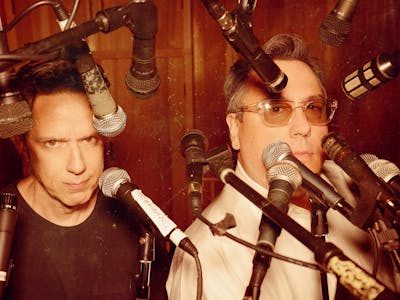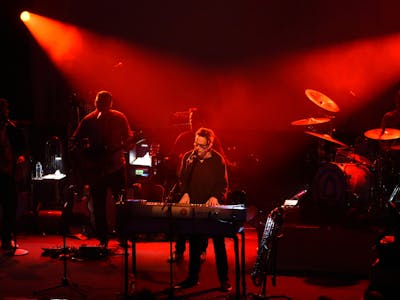Over the last thirty-six years, They Might Be Giants have managed to create a prolific body of work, maintain an ardent fanbase and consistently sell out shows worldwide. To paraphrase “Birdhouse in Your Soul”, like the Longines Symphonette, it seems they never rest. They’ve carved their own path and survived multiple changings of the guard in not only musical styles, but in how music is generated and distributed. It’s an interesting experiment to go back and listen to Flood (1990) and think of everything waiting in the wings, most notably the arrival of Nirvana’s Nevermind the next year and the opening of alternative rock to a wider audience. And in these days of high speed internet, it’s hard to imagine a time when file sharing meant using your landline to connect to one person at a time using cassette answering machines. They recently released their twentieth studio album (the delightful I Like Fun). It’s a prime example of their trademark blend of unabashedly smart, tuneful songs and top-notch musicianship spiked with idiosyncratic wordplay.
John Flansburgh was kind enough to take time out from their fifty-city U.S. tour to answer some questions in advance of their upcoming show at the Madison Theater. He shared insights on revisiting Flood in its entirety, the mysteries of why parts of the new album rock, the potential pitfalls of writing “kids” songs and how caffeine and fans factor into their longevity.
The band is on tour playing Flood in its entirety. Are you staying close to the original arrangements? Are there any songs you listen to now and want to rework based on what you’ve learned in the last 28 years or the current band lineup?
It’s a good question but I want to note that our show in Covington is actually the only show this year where we are playing the album Flood, so it is very special. As to our approach to this show–we are a six-piece band now so it is quite different than the drum machine-led sounds of the original album. In some ways, it’s just naturally more raucous, but there are a lot of small, specific musical ideas we take care to remember because we know there will be a lot of close listening. On the clutch of songs we play at most shows we have extended some parts, but most of the songs we rarely play so we just play the sharpest version we can render. But possibly the coolest thing about playing Flood live with this touring band is having Curt Ramm on board on the trumpet since there are a number of show-stopping trumpet moments on the album and being able to bring that to the stage live is very satisfying for everyone in attendance.
I’ve been listening to the new album a lot and I’m struck by how rocking and aggressive some songs are. Songs like “All Time What”, “The Bright Side” and “An Insult to the Fact Checkers” almost sound like they could be on a Superchunk album. Can you talk a bit about the genesis of these songs? Are they a reaction to more turbulent times or just a primal need to rock out?
Personally, I feel like this whole album is very much a product of its time, but that wasn’t so clear to me until all the songs were gathered together at the end and the general angst of the project materialized. Until that point, it just seemed like a pile of songs, but collectively it becomes something else and maybe something more coherent on an emotional level. The specific songs you noted come from pretty diverse impulses; "All Time What" is a breakup song, "Fact Checkers" is essentially an “I hate you” song and "The Bright Side" is a pretty impressionistic reminiscence of folks I knew a long time ago. Now the reason these songs are all so rocking I can’t say, but Superchunk is one of the greatest bands around so I’ll take it!
As a parent of a kid that is into music and science, I wanted to thank you for Here Comes Science as well as Here Come the ABCs and Here Come the 123s. The first time we put these on, I thought, “Thank goodness, I would listen to these anyway, these are great!” I wondered if some of your fans never picked these up because they were ‘kid’ albums. Did you ever have any reticence about putting a song on those albums and thinking, “We should save this for one of our ‘adult’ albums?”
Well, you are most certainly welcome. We don’t have such a solid grasp of where people come in and out of tracking our work but I do suspect some folks stepped off when we started doing kids' stuff alongside our adult stuff. There is so much identity politics in liking a band--what teenager or college student is getting into bands that do kids music? That’s the risk doing stuff for kids, at least from a rock band’s perspective. You are kind of relinquishing the outsider/permanent adolescent posture that is the standard pose of most musicians for what will inevitably scan as something safer and kinder.
But we aren’t teenagers or young adults and I don’t think there is any real reason we can’t hold on to our weirdo status and also make stuff for kids, especially since the way we approached the kids' stuff was so focused on not diluting the work. From the first kids' project, we didn’t hold back on rhythms, general loudness, production values or song quality. I think our take was just to do the kind of stuff we do, but with an eye to making it work for kids as well as ourselves. We even had trepidation about doing projects with educational themes since making songs for kids that didn’t even aspire to make kids “better” was such a blast. But ultimately those topics provided a lot of fuel for songwriting.
I first discovered you when “Don’t Let’s Start” came out on MTV (on 120 Minutes) back in the ‘80s. A guy I know said, “This band will never last. They got three songs in and already ran out of material (the song “Number Three” with the lyrics, “There's only two songs in me and I just wrote the third/Don't know where I got the inspiration or how I wrote the words/Spent my whole life just digging up my music's shallow grave/ For the two songs in me and the third one I just made.” Twenty albums and 32 years later, any last words for him?
In many ways, we work in a vacuum, and that suits us. Personally, most of the time the whole 32 years seems like one long run. I don’t think our longevity really proves anything at all except our commitment to drinking coffee and our awesome audience. We get our music into the world and a lot of folks over the years have found us and enjoyed our stuff, and on occasion, we get some very flattering praise. As a writer and performer that seems like about as good a deal as one could ask for.
They Might Be Giants play the Madison Theater in Covington, Kentucky on Tuesday, April 17.



